Tell me how this sounds: writing for businesses behind the scenes and earning BIG money while you do it.
You need to pursue ghostwriting if that interests you.
It’s one of the most lucrative freelance writing paths you can take, and there’s nothing that can’t be ghostwritten.
That means you can still carve out your own niche in ghostwriting, such as writing books or whitepapers, for example.
While this sounds nice and all, how do you get started? How do you get jobs? These are common questions that run through the heads of writers.
Freelance writing seems like a simple thing to jump into, but it takes strategy and planning to make serious cash.
That’s why today I’m going to teach you how to become a ghostwriter, get paying clients, and what skills you need to do so. 👻
Let’s jump in!
What is a ghostwriter?
First of all, let’s define what a ghostwriter is.
According to our good friend Google, a ghostwriter is:
A person whose job it is to write material for someone else who is the named author.
You’ll be creating blog posts, case studies, scripts, or other material for businesses but you will not receive any credit for it.
This means no bylines or author biographies. That is one big downside to ghostwriting since you don’t grow your own brand, but it allows you to charge higher rates.
Ghostwriters are some of the highest paid writers in the world because of this reason.
That brings me to my next point.
How much do ghostwriters earn?
Let’s check out a few different sources to get an idea of the money you’ll be making as a ghostwriter.
Ghostwriters earn $47.50/hour on average according to PayScale.
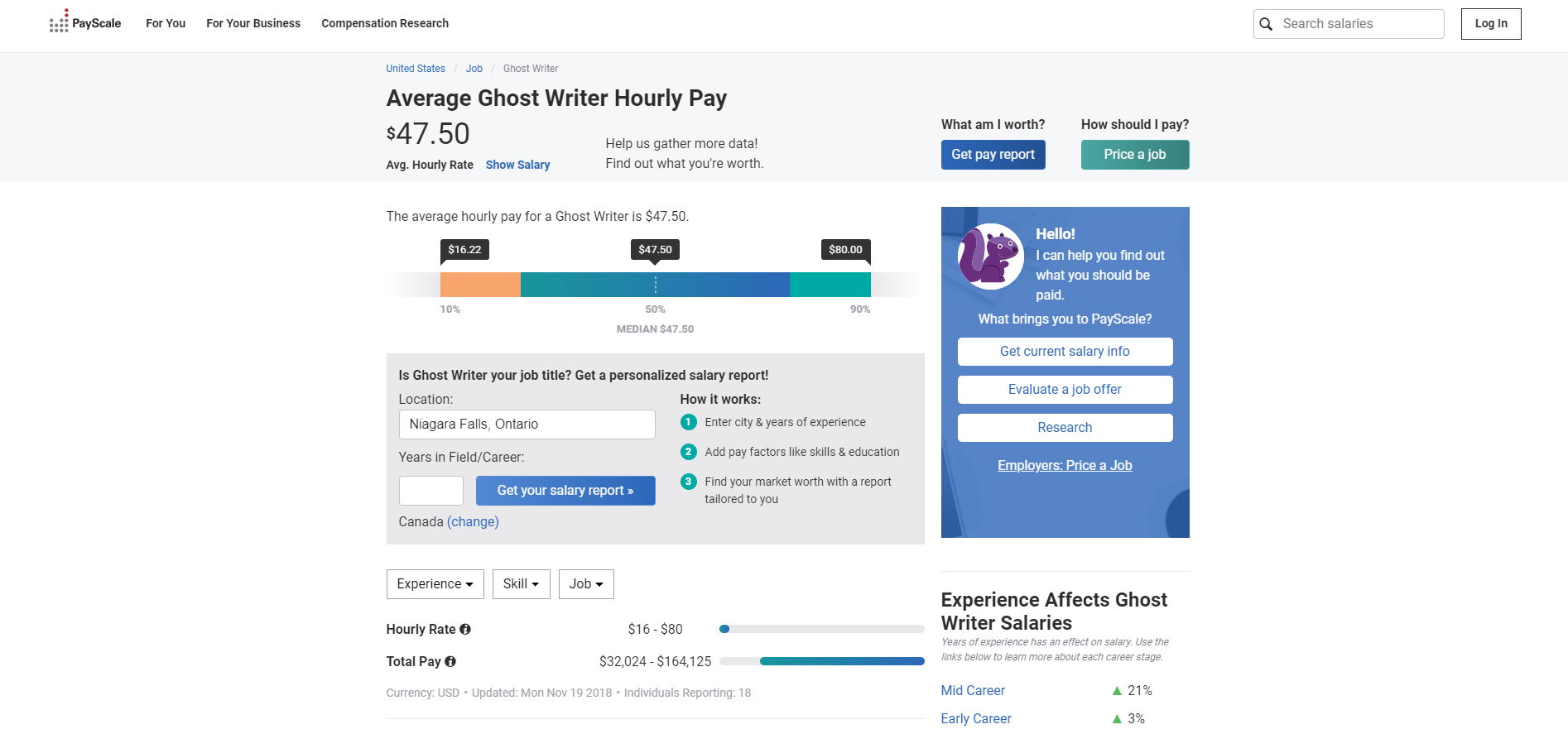
The low end of hourly wages is $16.22 and the high end is $80. This will change depending your experience level and how much you decide to charge.
The total annual pay based on these amounts is anywhere from $32,023-164,125!
Wouldn’t it be nice to earn an extra $32,000 every year on top of your day job?
Heck, if you work hard enough you could generate six figures as a ghostwriter being your own boss.
I searched for ghostwriter salaries on ZipRecruiter, and found similar data.
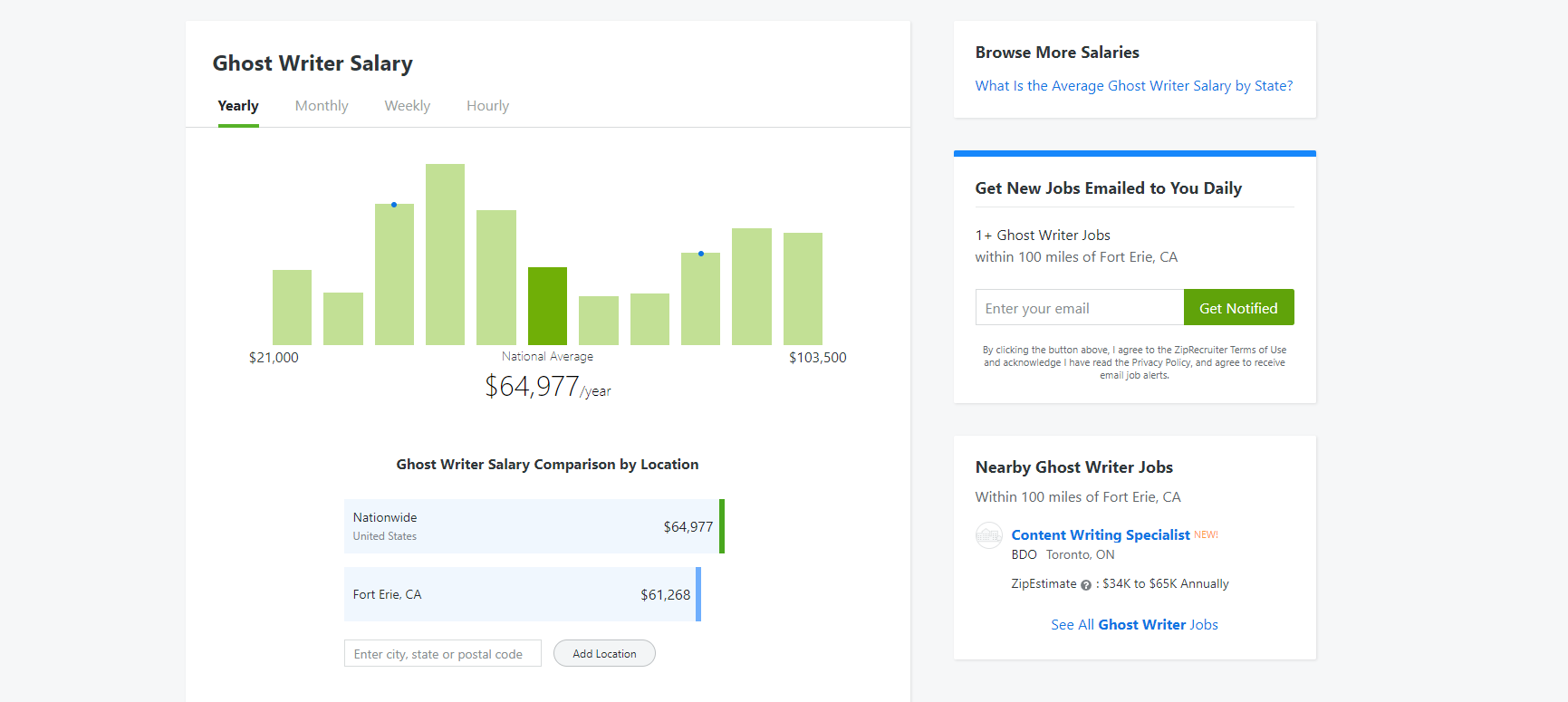
They claim that ghostwriters make $64,977 per year on average, and the high end is $103,500. Not bad 🙂
It seems like it doesn’t matter if you’re newbie or pro at ghostwriting because you can earn great income either way.
Lisa Tener, a successful freelance writer, explains that ghostwriters should charge $1-3/word, $30-200/hour, or $5,000-100,000 for book projects.
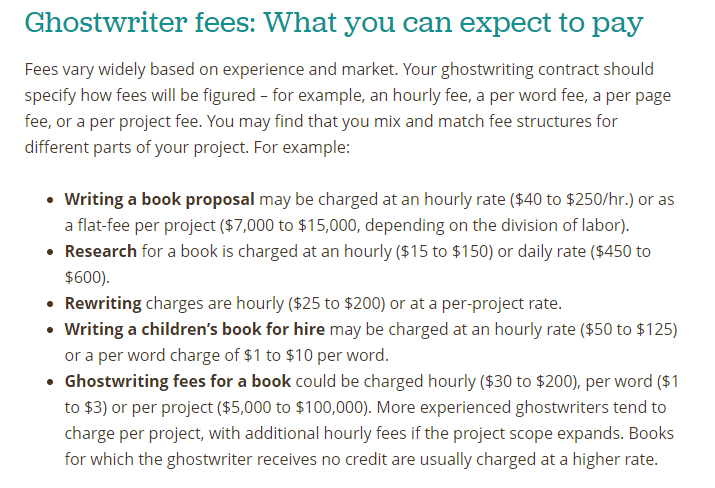
Is ghostwriting legal?
Yes, ghostwriting is completely legal, but it also depends on what environment it’s used in.
Since we’re on the topic of business and freelancing, ghostwriting is NOT illegal in any regards.
Companies can outsource any tasks or projects as they please, and it’s up to them to use good ethics while doing so. I’ll touch on that more in a bit, though.
But if you’re a student hiring a ghostwriter to complete an intense essay for you, the rules might change. Certain colleges might consider that plagiarism and you could be expelled.
I would perform due diligence and research before hiring a ghostwriter outside of a business environment because it may operate differently.
Is ghostwriting ethical?
Good question, and one that’s not asked enough in my opinion.
I personally believe that there is nothing unethical with ghostwriting as long as it’s approached honestly.
Imagine the following scenario to understand what I mean:
- A client reaches out to a service provider for a landing page to be written.
- The service provider takes on the project but outsources it to me because I offer content writing services.
- I complete the landing page and the service provider hands it off to the client.
- The service provider either claims they produced it in-house (unethical) or explains they outsourced it to a writer more experienced than them (ethical).
There is an ethical and unethical way to approach any process in business, and writing is no different.
If a business has a ghostwriter produce an advertisement for their own campaign, that’s completely okay.
But if a company outsources its client projects to a ghostwriter and claims it as their own, that’s a no-no.
Practically everything is outsourced these days, anyway. Think about social media marketing, app development, or other services where the service provider isn’t named.
Copywriting shouldn’t be looked at any different.
Who uses ghostwriters?
Who is actuallying hiring ghostwriers and paying these big bucks?
I ghostwrite for my clients all of the time and industries can vary a lot.
One niche that is very common is C-Suite ghostwriting. I write Forbes articles, blog posts, and other thought-leadership content for my clients in CEO and similar positions.
This is fun because you get to write for huge publications and write on behalf of very successful individuals.
Besides that, authors very commonly need ghostwriters for books. Often these range tens of thousands of words and it can be challenging to do it yourself.
Naturally, they outsource it to someone like us. 🙂
Lawyers and dentists also commonly hire ghostwriters. These are high-paying occupations where the business owner is too busy dealing with clients and important tasks.
They outsource content and copy to freelancers for this reason.
But, frankly, you can find ghostwriting clients in practically any industry and niche.
Is ghostwriting worth it?
It depends.
If you’re interested in charging a premium, boosting your income, and being behind the scenes, then heck yeah!
It’s one of my go-to services for clients but as I mentioned, here’s the deal…
You don’t get any bylines or credit so it’s good to mix in guest authoring and byline projects so you gain exposure.
If you’re dead-serious about building a personal reputation, generating backlinks, and getting your name out there, ghostwriting might not be for you.
I recommend getting best of both worlds but the choice is yours. 👍
Ghostwriting skills
What skills do you need as a ghostwriter? What separates the good from the great? These are some of the masteries you need to develop if you want to become a successful ghostwriter.
Your editing needs to be sharp
Once you put down the pen, your job has just begun.
Editing and revisions are a mandatory step in writing any form of sales copy of business material.
Unless you’re all of the world’s greatest copywriters combined, you’ll never produce a flawless project on the first try.
There will always be little edits, changes, and improvements you can make.
This is also why I firmly believe in the practice of writing as fast as possible. Churn out high-quality copy like a typing machine, then worry about grammar and punctuation afterward.
I like using this technique specifically with projects that have the goal of selling something. Writing quickly allows me to use the emotional and creative side of my brain which is perfect for these situations.
Install the free Google Chrome extension Grammarly to make all of this easier and less of a headache.
Here’s what my screen looks like as I’m writing this article right now:
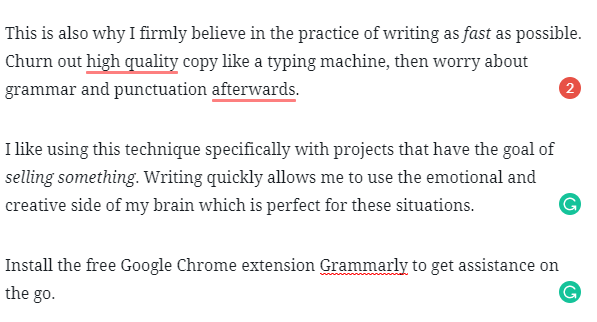
It will highlight spelling mistakes and improvements you can make.
You can use other tools that achieve this same effect if you’d like.
Overall to be an excellent ghostwriter you’ll need a thorough editing process to polish off projects.
Related reading: 11-Point Copyediting Checklist For Perfectly Polished Copy.
Proofread like a professor
What comes after editing? Proofreading!
Remember how hard your professors would critique assignments and papers? Do that to your ghostwriting.
Go sentence-by-sentence and ensure that it flows logically and is easy to read.
Technically you could have a project that has no grammar mistakes, but it can still lack the proper voice and order of points.
That’s why after you’ve completed the editing stage, I suggest giving your copy an honest read to re-organize sections, remove fluff, etc.
Understand the staples of copywriting
It doesn’t matter if you’re ghostwriting a book, blog posts, or product descriptions.
You need to know fundamental copywriting strategies, as they can be applied to about every project universally.
These techniques include:
- Elaborating on the benefits of a product and not only the features.
- Telling stories that captivate readers and make them feel emotions related to the product being sold.
- Positioning a product as the solution to the pain points of consumers.
- Writing in a casual and friendly tone.
- Using calls to action which help customers move through the sales funnel quicker.
- Creating a slippery slope with your words and sentences, making it very easy to read the copy until the end.
- Being able to research any audience, study them, and write specifically to their interests and problems.
This list could go on for hundreds of bullets, but my main point is that you need to have the staples down pat first before jumping into ghostwriting.
Ghostwriters are normally very experienced and clients will have higher expectations because of this.
A few books I suggest reading to learn these tactics in-depth are:
- The Copywriters Handbook by Robert Bly
- Scientific Advertising by Claude Hopkins
- The Adweek Copywriters Handbook by Joseph Sugarman
How to get ghostwriting jobs
Let’s get into the fun stuff now…
Landing ghostwriting opportunities. 🙂
Freelance job boards
There will never be a time where I don’t recommend freelance writing job boards for writers to start getting gigs.
It’s a convenient and fast method for making money as a freelance writer, no matter if you’re a novice or veteran to the industry.
There are heaps of ghostwriting positions listed daily on these job boards, as well.
The process for all of them is the same, too. You simply navigate through the listings, find a job that interests you, and send in an application.
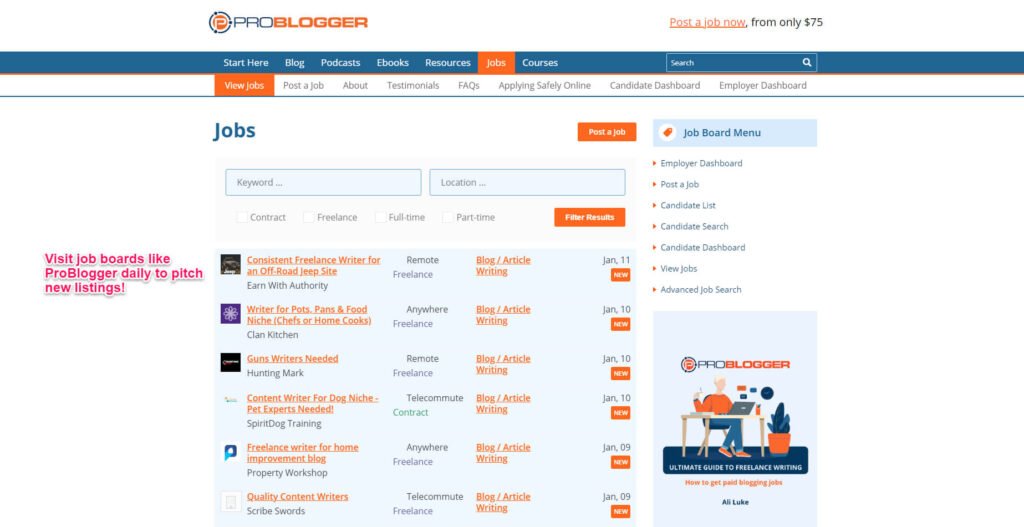
The employer will contact you if they’re interested in working together, and typically you’ll complete a trial assignment before any commitment.
Check out these posts I’ve written on the best freelance job sites to learn more:
- How to Get Freelance Writing Jobs and Make 6 Figures From Home
- 5 Freelance Writing Job Boards For Earning Big Cash and Hiring Amazing Writers
- The 8 Best Freelance Websites to Build Insanely Effective Remote Teams
I suggest that writers create a routine in which they check specific job boards on a regular basis. This will maximize their odds of landing ghostwriting jobs.
I use to check them every morning for a few minutes back in the day when I relied on them for work as an example.
Have a pitch template you can customize for every gig, as well. This will save you time and make the application process streamlined. It might look like this:
Good morning,
My name is {Name} and I’m a freelance ghostwriter that’s worked with clients like {Clients}. I’ve helped them grow and achieve results like {Results}.
Here are some examples of my best ghostwritten work:
{Example #1}
{Example #2}
{Example #3}
I currently charge {Rates} for ghostwriting and you can learn more about me on my website at {Website} or through my attached resume.
Warm regards,
{Name}
This template and approach have worked very well for me and my course students.
The general idea is to keep it short and sweet. Someone going through dozens or hundreds of applicants isn’t going to read a long CV or email.
Rather, begin by using social proof and talking about clients you’ve worked with. Don’t worry if they’re not household names, anything counts.
It’s also extremely important to mention the results you’ve generated for clients.
After all, why does someone want a ghostwriter? It’s not just to take the weight off their shoulders but to drive traffic, leads, and so on.
Show examples of your work (or link to a portfolio) and attach a resume.
Check out the freelance sections of Reddit
There are at least a dozen sub-reddits dedicated to freelancing and writing that will help you find ghostwriting positions in the snap of a finger.
These communities are dedicated to listing job opportunities and allow freelancers to advertise themselves free of cost.
Here’s the subreddit /r/writersforhire for example:
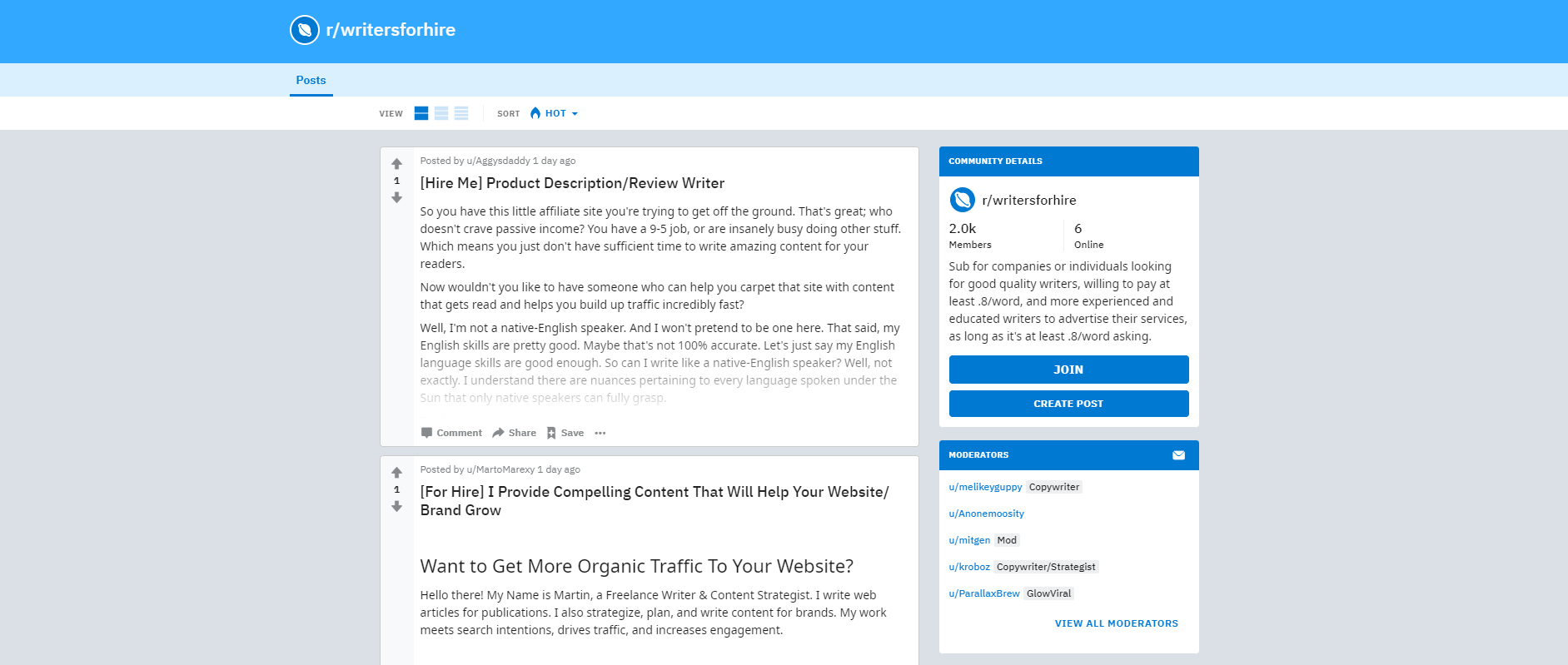
There are new gigs posted every day and most of these sections of Reddit allow you to promote yourself once per week.
This means that you can actively search them to lang gigs and opportunities will come to you, as well.
Sign up for a free Reddit from the top right account to begin.

Next, visit any of the following subreddits:
- /r/hiring
- /r/forhire
- /r/b2bforhire
- /r/jobbit
- /r/writersforhire
- /r/freelance_forhire
- /r/hireawriter
- /r/Writingjobboard
Click the “Submit a new text post” button on the right to create your own thread.

Follow the individual subreddit’s rules from the sidebar to make sure that you don’t get banned and your thread stays up.
Some state that you must mention your rates, include portfolio pieces, charge no less than X amount, etc.
Create a thread on all of the above subreddits advertising your ghostwriting services, and you’re bound to get some interesting leads contacting you.
Don’t forget to browse these just like you would with freelance writing job sites, and reach out to any users that post a gig that suits your skill level.
Read my complete listing of freelance writing subreddits here.
Blog to get ghostwriting clients
I’ve landed some of my highest paying clients while I slept.
Do you know how I did it?
Blogging.
Inbound marketing is so effective that I think you’d have to be crazy not to use it as a copywriter of any sort.
Heck, you’re a writer after all, right? It only makes sense to showcase your skill via blogging and writing other forms of content.
93% of businesses already use inbound marketing to drive sales, so don’t be late to the party.

Putting off inbound means that competitors will get further ahead the later you start.
Use a free platform like Medium.com to start blogging if you don’t have a personal website.

There are many businesses and freelancers that create massive followings on Medium alone.
However, I do suggest that you eventually invest in a domain, web hosting, and brand yourself via a personal site.
You can use it as a content hub to draw clients to you organically through search engines.
It begins with topic and keyword research. I suggest trying out AnswerThePublic.
Type in a topic idea and click the search button.
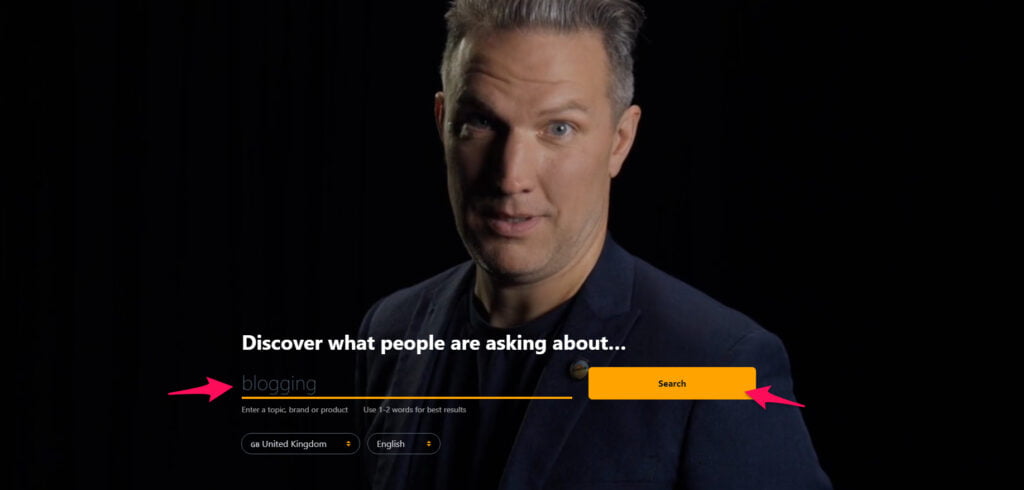
This will give you questions, prepositions, comparisons, and other brainfoods.
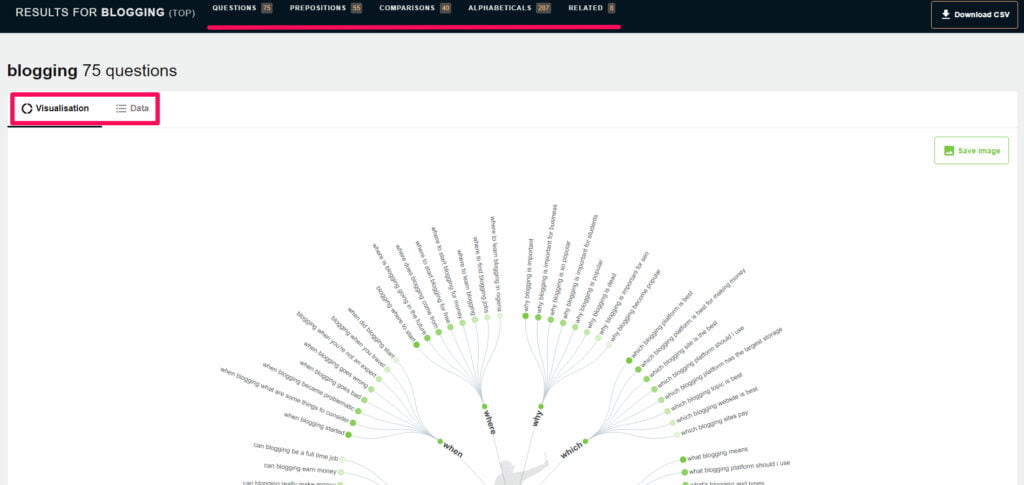
While I’d love you to write about your cat, it probably won’t move the needle.
Instead, focus on topics your ideal client would care about like:
- Business
- Marketing
- Hiring
- Copywriting
- Content writing
- Etc.
This will generate the highest quality traffic and make sure to end every post with a call to action.
Let them know you offer ghostwriting services or opportunities might slip through the crack.
Master the art of cold outreach
Every freelancer needs to master one skill.
Do you know what it is?
Cold outreach.
There’s nothing that will put you more in control of your success and income.
It’s wise to have a blend of both inbound and outbound efforts.
On one end, you have leads and opportunities coming to you organically.
On the other, you can make ghostwriting consistent and measurable.
I recommend starting off with cold emailing.
And I know what you’re thinking…
“Cold emailing doesn’t work.”
“I’ve tried that.”
Here’s the thing: most freelancers do cold emailing completely and utterly wrong.
Doing it correctly will generate you non-stop clients and projects.
It all begins with narrowing down the companies you want to write for and finding the decision makers.
Use Google searches, social media, or databases like Crunchbase to organize businesses you’d like to write for. Think about your passions, interests, and portfolio to decide on this.
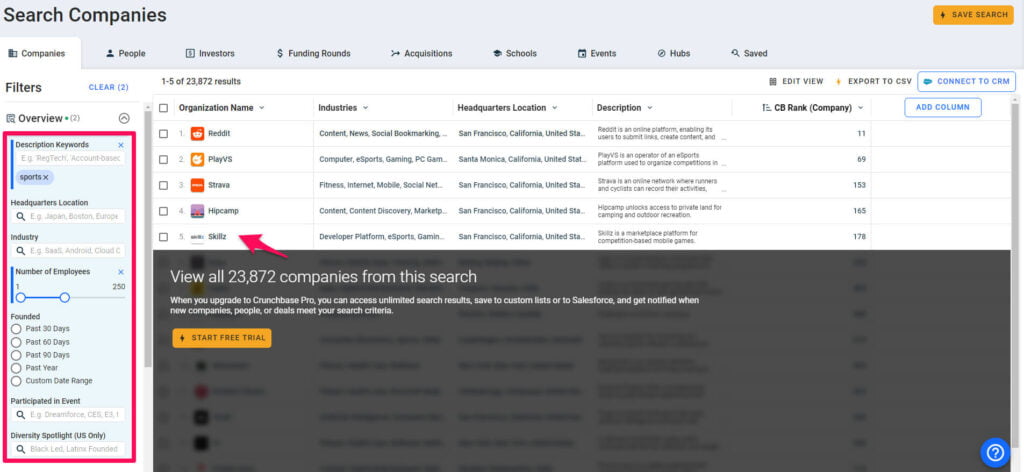
Then, take those websites and run them through a tool like RocketReach. Find the email of a marketing manager, marketing director, CMO, etc.
Send them a customized email similar to the one I gave for pitching job boards. The same rules apply:
- Customize it to each lead with a custom observation or compliment.
- Use social proof to build credibility.
- Show off portfolio examples.
- Talk about the growth and benefits you provide.
- End it with a strong call to action for a meeting or phone call.
Follow up on a regular basis until you get an answer. Be multi-touch as well. That means to ping them on Twitter, LinkedIn, and various channels.
Watch my video on this topic to learn more:
Take advantage of Facebook groups
I recently had a guest on my podcast that told me 78% of her agency clients come through Facebook groups!
How crazy is that?
They’re a very underrated way to get clients for any service and that includes ghostwriting.
The first step is to join copywriting and freelance writing related groups. Here are some I recommend:
Read the sidebar or stickied post to understand each group’s individual rules.
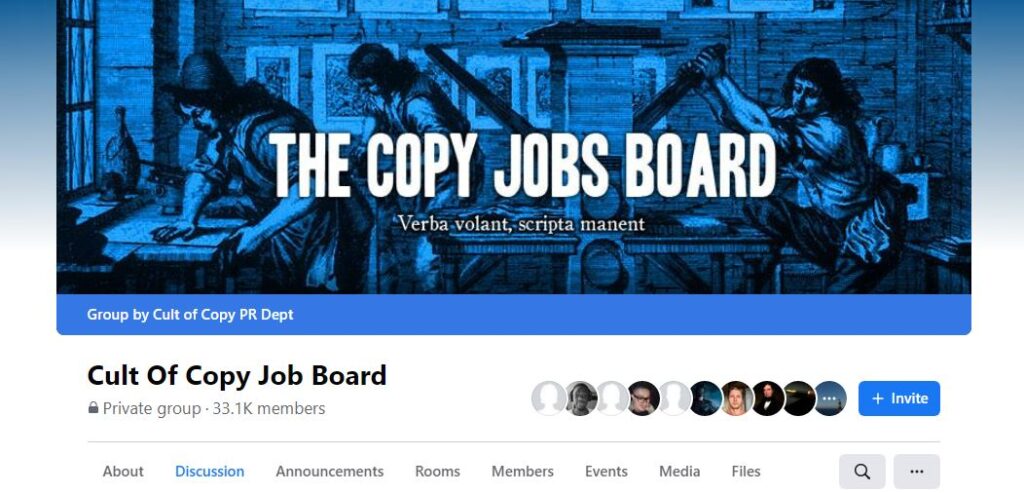
Some allow for self-promotion and others prefer you join in on conversations.
Either way, use these as a way to not only promote services but to show off your expertise.
Share content you’ve produced to get people coming back to your blog or website.
Final thoughts on how to become a ghostwriter
Learn how to become a ghostwriter might be the best decision you make as a freelancer.
It’s extremely lucrative and you will develop lifelong skills that transfer over into the copywriting projects.
However, you need to be a very skilled writer to pull this career off.
Touch up on the fundamentals of copywriting, editing, and the processes that go along with them.
Check out freelance job boards and apply to any gigs that seem worthwhile after you feel confident in your abilities.
The subreddits I touched on earlier are also awesome for finding ghostwriting opportunities.
Finally, nothing beats inbound marketing in my opinion, which is why you should create a blog and create a genuine fan base through publishing high-quality content.
Don’t wait around any longer. Use the steps I outlined today and jump-start your ghostwriting career. 🙂














